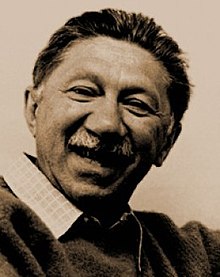Abraham Maslow
| Abraham Maslow | |
|---|---|
 |
|
| Born | Abraham Harold Maslow April 1, 1908 Brooklyn, New York |
| Died | June 8, 1970 (aged 62) Menlo Park, California |
| Nationality | American |
| Fields | Psychology |
| Institutions |
Cornell University Brooklyn College Brandeis University |
| Alma mater | University of Wisconsin–Madison |
| Doctoral advisor | Harry Harlow |
| Known for | Maslow's hierarchy of needs |
| Influences | Alfred Adler, Kurt Goldstein, Henry Murray |
| Influenced | Douglas McGregor, Roberto Assagioli,Colin Wilson, Abbie Hoffman, Wayne Dyer, Elliot Aronson |
Abraham Harold Maslow (/ˈmæzloʊ/; April 1, 1908 – June 8, 1970) was an American psychologist who was best known for creating Maslow's hierarchy of needs, a theory of psychological health predicated on fulfilling innate human needs in priority, culminating in self-actualization. Maslow was a psychology professor at Alliant International University, Brandeis University, Brooklyn College, New School for Social Research, and Columbia University. He stressed the importance of focusing on the positive qualities in people, as opposed to treating them as a "bag of symptoms." A Review of General Psychology survey, published in 2002, ranked Maslow as the tenth most cited psychologist of the 20th century.
Born and raised in Brooklyn, New York, Maslow was the oldest of seven children and was classed as "mentally unstable" by a psychologist. His parents were first generation Jewish immigrants from Russia from Kiev (now the capital of Ukraine) who fled from Czarist persecution in the early 20th century. They had decided to live in New York City and in a multiethnic, working-class neighborhood. His parents were poor and not intellectually focused, but they valued education. It was a tough time for Maslow, as he experienced anti-Semitism from his teachers and from other children around the neighborhood. He had various encounters with anti-Semitic gangs who would chase and throw rocks at him. Maslow and other young people at the time with his background were struggling to overcome such acts of racism and ethnic prejudice in the attempt to establish an idealistic world based on widespread education and monetary justice. The tension outside his home was also felt within it, he rarely got along with his mother, and eventually developed a strong revulsion to her. He is quoted as saying, "What I had reacted to was not only her physical appearance, but also her values and world view, her stinginess, her total selfishness, her lack of love for anyone else in the world – even her own husband and children – her narcissism, her Negro prejudice, her exploitation of everyone, her assumption that anyone was wrong who disagreed with her, her lack of friends, her sloppiness and dirtiness..." He also grew up with few friends other than his cousin Will, and as a result "...[He] grew up in libraries and among books." It was here that he developed his love for reading and learning. He went to Boys High School, one of the top high schools in Brooklyn. Here, he served as the officer to many academic clubs, and became editor of the Latin Magazine. He also edited Principia, the school's Physics paper, for a year. He developed other strengths as well:
...
Wikipedia
